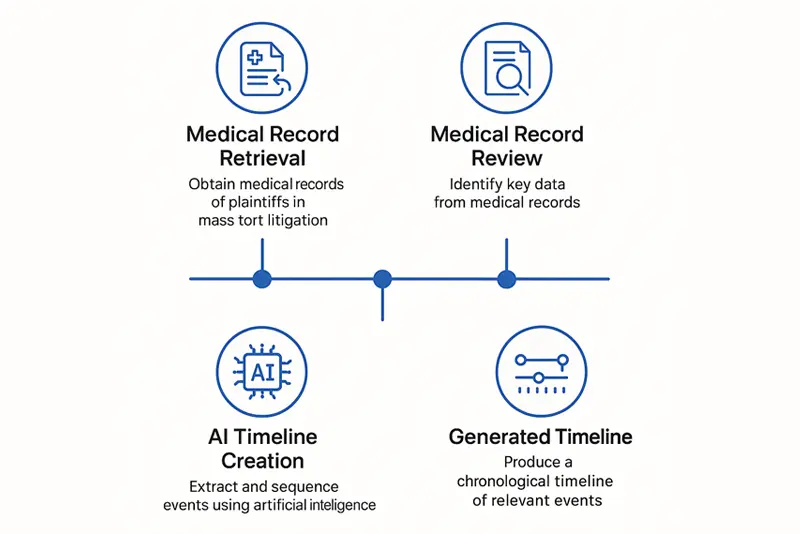AI timeline construction is transforming how attorneys and their teams manage extensive mass tort and product liability litigation. With hundreds-or even thousands—of plaintiffs to support, transforming unstructured medical data into accurate, chronological case narratives can be really challenging. There is no doubt that you need reliable tools for this, and AI-powered tools enable faster, smarter timelines that directly support litigation success.
Along with outsourced medical record retrieval and review services, and systematic management of the Plaintiff Fact Sheet (PFS), this technology-driven approach ensures excellent efficiency and precision in handling even complex legal claims.
Why Timelines Matter in Mass Tort and Product Liability Cases
In mass tort or product liability litigation, particularly those involving pharmaceuticals, defective products or toxic exposure, case success often hinges on the ability to:
- Establish causation or clearly associate the incurred injuries with product use
- Legalize eligibility based on exposure and diagnosis dates
- Identify pre-existing conditions or latency periods
- Develop strong case narratives or strengthen negotiation positions across a plaintiff pool
Manual timeline creation can be labor-intensive and prone to error. That’s why law firms are turning to AI timeline construction tools to automate and enhance this crucial process.
How AI Timeline Construction Reinforces Legal Strategy
AI tools utilize advanced natural language processing (NLP) and machine learning (ML) to extract, organize, and display medical events chronologically. For instance,
- Diagnoses and symptoms
- Hospitalizations and surgeries
- Medication usage timelines
- Important events associated with regulatory data (such as FDA recalls or label changes)
These features ensure consistency and efficiency across large plaintiff cohorts, especially in multidistrict litigation (MDL). With a good and accurate timeline, attorneys can analyze claims faster, detect red flags, and support arguments around causation and liability that form the foundation in mass tort litigation strategy.
Importantly, AI-assisted medical record review and timeline creation is an automated process that enables attorneys and their support teams to focus on case strategy. They can review structured records in minutes instead of having to manually search through piles of medical documents. Data inconsistencies or missing events are detected and dealt with appropriately. The AI platform also detects and eliminates duplicate pages or redundant medical records. This helps reduce the review time and ensure that only relevant records are analyzed. AI simplifies the chronological sorting and summarization process by quickly identifying and extracting the required data and arranging it all in proper order. Also, it scans the entire set of medical records to prepare a concise summary of each plaintiff’s medical history. The summary is delivered in the attorney’s preferred style and format. This helps legal teams streamline case analysis, identify trends across plaintiffs, and optimize their mass tort litigation strategy.
AI Chronology Creation – The Process
Medical Records and Plaintiff Fact Sheets (PFS) Are Important
Mass tort success is built on two key sources of evidence:
Medical Records
These provide an impartial basis for:
- Injury verification
- Treatment chronology
- Exposure windows
- Prior or unrelated medical conditions
With AI integration, you can quickly generate medical chronologies that align with legal needs.
Plaintiff Fact Sheets (PFS)
These standardized court-required documents contain information on each plaintiff’s:
- Medical and product usage history
- Employment background
- Claimed injuries
- Healthcare providers and treatment records
AI timeline construction tools can validate data between the PFS and actual records—ensuring factual accuracy and reducing the risk of claim dismissal.
Outsourcing Medical Record Retrieval and Review for a Strategic Advantage
Even the best AI systems require properly organized or structured, clean data. To ensure this, outsourcing medical record retrieval and review is the best strategy to adopt, especially if yours is a law firm handling high-volume litigation.
So, what are the benefits of outsourcing?
- Scalability: Effortlessly handle hundreds or thousands of requests with consistency
- Speed: Speed up the intake-to-analysis timeline
- Expert Review: Professional medical-legal reviewers pinpoint claim-relevant facts
- Compliance: Secure handling of PHI under HIPAA regulations
Outsourcing allows your legal team to focus on strategy while experts manage the record collection, indexing, and review process efficiently.
Combining AI and Outsourcing for Better Mass Tort Outcomes
Here’s how law firms can gain a competitive edge:
- Use AI timeline construction to automate chronology building
- Outsource medical record review to manage volume and complexity
- Integrate PFS validation for defensible, accurate claims
This integrated workflow not only reduces costs and delays but also enhances case quality and readiness for negotiations, depositions, or trial.
The mass tort and product liability litigation landscape and strategies are constantly evolving. To stay ahead you need a proper mix of technology, medical expertise, and scalable operations. By leveraging AI timeline construction, supported by outsourced record review and thorough PFS management, legal teams can operate faster, more accurately, and more effectively — delivering stronger outcomes for every client.
Enhance Your Litigation Strategy with AI Timelines – Get Started Now





